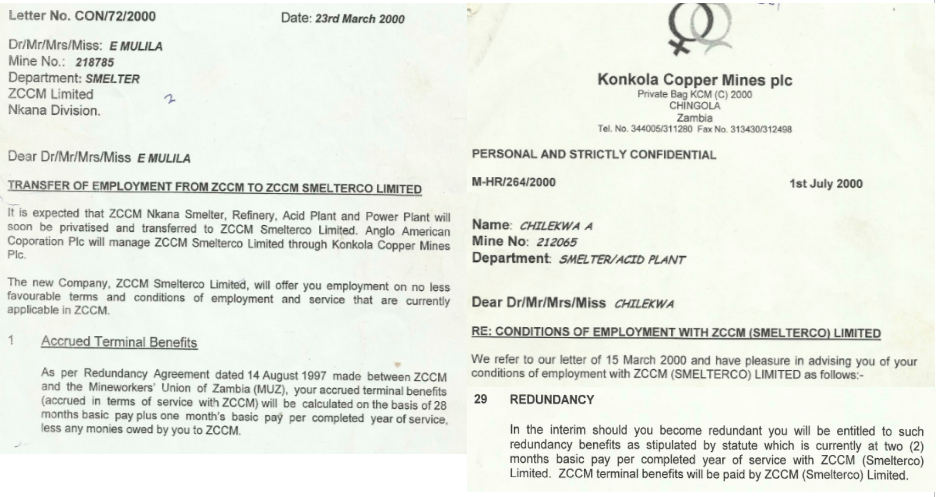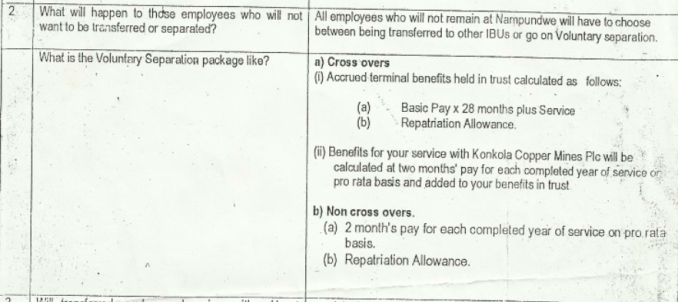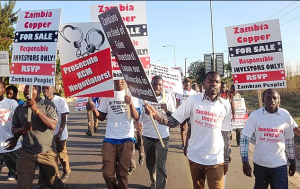 7th July. In May this year Foil Vedanta released a video showing Vedanta boss Anil Agarwal mocking the Zambian parliament and bragging that he makes $500 million per year from Konkola Copper Mines (KCM), having bought the company for $25 million, against a $400 million asking price. The video caused outrage in Zambia, where KCM has failed to pay taxes, and is indebted to contractors. A few days later hundreds protested in the streets in Lusaka demanding that Vedanta pay taxes and improve the conditions for workers. In light of the profitability of KCM claimed by Agarwal, this article examines the poor treatment of KCM workers by Vedanta, and some of the recent protests by current and former miners.
7th July. In May this year Foil Vedanta released a video showing Vedanta boss Anil Agarwal mocking the Zambian parliament and bragging that he makes $500 million per year from Konkola Copper Mines (KCM), having bought the company for $25 million, against a $400 million asking price. The video caused outrage in Zambia, where KCM has failed to pay taxes, and is indebted to contractors. A few days later hundreds protested in the streets in Lusaka demanding that Vedanta pay taxes and improve the conditions for workers. In light of the profitability of KCM claimed by Agarwal, this article examines the poor treatment of KCM workers by Vedanta, and some of the recent protests by current and former miners.
KCM is Zambia’s biggest employer with 18,000 workers, 11,000 of which are reported to be on short contracts and un-unionised. Vedanta took over KCM from Anglo American in 2004. Since KCM was privatised in 2002, miners claim their conditions have worsened, and protests have become even more regular in recent years.
.
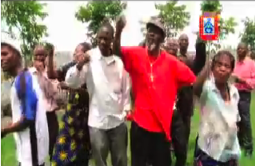
One active group are the Former KCM Miners Association. They represent more than a thousand retrenched and discharged KCM miners, including the 752 who were made redundant when Vedanta closed the Nkana smelter in 2009. (The Nkana smelter had not long been refurbished with an $81 million loan from the UK’s Department for International Development in 2001). The former miners have produced lengthy documents evidencing in detail how the 752 miners retrenched in 2009 were never paid the terminal benefits owed to them, due to deliberate manipulations by KCM (owned by Vedanta). In January 2013, in a letter to a news blog site, they claimed:
.
We are more than 700 ex-miners languishing in poverty after KCM breached our contracts. We have all the necessary agreements.
Since 2009, we have been spending sleepless night engaging government officials like Mr Musukwa, Ronald Msisika, Mr. Shamenda, Mr Simuusa, Mr Mikanga, Mr Mbulu. Even the President is aware but it is like KCM is bigger than our leaders. We visited Cabinet office on 12th February, 2012 but to no avail. We spent 180 days at intercity bus terminals in Lusaka surviving on pamelas and cabbages.
According to the Standard Code Book issued by the Industrial Relations Bureau, and not changed since 1996, the terminal benefits owed to miners should be ‘28 months basic pay, plus one month’s basic pay per completed year of service less any monies owed by you by [the mining company]’. In 2000, the state mining company ZCCM became ZCCM Ltd and ZCCM Smelterco. Employment contracts were re-issued to ‘reaffirm KCM’s responsibility to honour its contractual obligations’, and though some of them contained the original, and legal, terminal benefits, others stated a new redundancy package of just ‘2 months basic pay per completed year of service’, removing the 28 months basic pay workers remain entitled to according to the Standard Code Book. Employees noticed the discrepancy and refused to sign the new document, claiming this change was illegal under labour laws.
.
The pictures below show two versions of ZCCM Smelterco’s new contracts issued in 2000, with the legal, and illegal redundancy packages.
In 2009, around 700 workers were made redundant from the Nkana smelter and, in violation of their contract, were prohibited from re-entering the plant on the day they received their termination letters. A few months later more employees were retrenched at KCM’s Nampundwe mine. An information sheet issued by KCM at the time stated that there would be two different rates of redundancy pay for the workers – those transferring to other IBUs, and those taking voluntary separation. The former would get the legal 28 months plus 2 months (in this case) per year of completed service, which the latter would get only the 2 months per year of completed service. (see below)
The former miners give examples of two of the workers retrenched in 2009. Mr Wambizi worked 25 years, but was only paid 28 months plus 5 years service (calculated from 2004 when Vedanta took over ZCCM Smelterco and it became KCM Plc). Mr Chitu worked 5 years, and was paid 2 months basic pay per year of service. The miners have fought this discrepancy ever since, demanding the full payment from Konkola Copper Mines, the Mine Workers Union and government departments.
In January 2011 the Zambia Revenue Authority (ZRA) contacted the retrenched miners to say they had underpaid tax on their redundancy payments, showing a record of payouts of the full amount (28 months plus 1 months pay per completed year of service). The miners claim this suggests that KCM sent termination slips with the correct amount of terminal benefit due to the tax office, while sending the reduced payments and termination slips to the miners.
.
In December 2013, 76 workers retrenched in a spate of new redundancies by KCM claimed they had also been paid ‘peanuts’ in benefits.
In February this year the former KCM miners protested again, stating that they are owed over two hundred and seventy two thousand kwacha in terminal payments.
But it is not just former KCM miners who are getting a raw deal. On 8th May around 400 KCM contract workers stormed the Zambia National Broadcasting Corporation (ZNBC) offices in Kitwe during a protest over KCM’s refusal to implement the minimum wage. One worker, Mr Chisenga, told the Zambia News and Information Service that the workers were paid as low as K600 when their colleagues on the full time payroll were paid above K3000. According to the Lusaka Times:
.
He said the workers were demanding a pay rise to a level where the lowest should be paid at least K2000. He added that the workers were not provided with safety clothing while on duty which he said was putting their lives at risk. He said government should not allow workers in the mining sector to be exploited with poor wages when the investors in the sector were making a lot of money from the Zambian mineral resources. Mr Mulenga also complained that the police tear gassed the workers who were peaceful and did not commit any crime but merely walked to ZNBC studios to air their grievances.
.
The news crew that rushed to the scene found scores of employees heading to the Labor Offices at government offices otherwise known as BOMA in Kitwe, but were dispersed by police in riot gear before they could reach BOMA.
When reached for comment, management run away from journalist and declined to comment.
.
A soundbite in local language from the demonstration can be heard here.
.
On 17th March over 100 miners at Konkola Copper Mines’ Shaft No 1 in Chilililabombwe refused to come out from underground after their day shift in protest against management’s decision to stop giving meals to those that had worked overtime. They stayed underground from morning until 9pm. According to reports:
The miners alleged that management had started implementing harsh conditions of service for them as a way of saving on costs, a situation that was making their working conditions unbearable.
.
“We are passing through difficult times as employees; salaries leave much to be desired, our unions have tried to make things better but it’s really difficult with the style of management being applied by these investors. Now because they have tightened their financial management issues, they have cut on our meals and the issue of miners getting meals is an age-old tradition, which cannot be abolished in such a manner. We cannot continue operating like that. We demand respect from KCM management,” one of the miners said.
.
In May 2013 KCM’s management announced their intention to retrench 2000 workers to streamline and mechanise operations. This was met with outrage by both miners, and Zambia’s President Michael Sata, who threatened that he would revoke the mine’s license if redundancies went ahead. Some commentators claimed the retrenchment threat was being used to prevent the Zambian exchequer charging a $586 million tax bill on exports of copper cathode which had no import certificates from the port of destination.
.
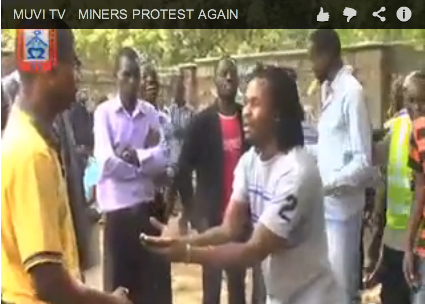 Following this announcement hundreds of KCM miners from Chililabombwe, Chingola and Kitwe stormed the Mineworkers Union of Zambia (MUZ) head offices in Kitwe to protest KCM’s plans.
Following this announcement hundreds of KCM miners from Chililabombwe, Chingola and Kitwe stormed the Mineworkers Union of Zambia (MUZ) head offices in Kitwe to protest KCM’s plans.
.
Malambo Malambo who spoke on behalf of members of the three unions accused KCM management of trying to use the retrenchment as a tool to negotiate for mineral royalty tax and increased electricity tariffs. He said it was unjustifiable for KCM management to attribute their planned downsising to workers not meeting their targets.
.
“It is not true that KCM employees are failing to meet their targets. It is because of management’s failure to provide tools and equipment, change of contractors which takes time for them to mobilise and settle,” Mr Malambo said. He said the decline in production levels at KCM was not as a result of workers but management itself which had engaged contractors that were ill-qualified. “Ninety per cent of the work at KCM is done by contractors and why should they blame workers for low productivity,” he asked.
In November 2013 200 unionised workers refused to go underground and assembled in Chingola, protesting the deduction of 20% of pay from October’s salaries. KCM justified the deduction as they claimed miners had not met targets specified by management, but the miners were adamant that they had met targets and stormed the union offices accusing Mine Contractors and Allied Workers Union of Zambia President, Benny Isao of failing to represent them, as this video shows.
.
KCM had been deducting excess tax from workers since the retrenchment was announced in May, by claiming the workers had previously underpaid tax, and deducting the backdated amount from the paycheques, leaving them with up to half their usual salary. This went on for a few months until union action put a stop to it and the excess tax was eventually refunded.
.
Back in February 2013, KCM was embroiled in another scandal when 11 Zambian managers were fired ahead of planned ‘downsizing’. When information on the terminations was reported in the media, KCM bosses became angry and ordered some workers to leave the premises immediately without collecting their belongings. According to AllAfrica:
.
Affected workers, who sought anonymity, wondered why KCM had taken such an action when expatriate workers, who were not affected in the purported downsizing were getting more than US$17,000 (KR371,000) on a monthly basis compared to what Zambians were getting
“We were questioned about who leaked the information to the media and we wonder why the so-called reducing of labour force has only affected Zambians and not expatriates because some expatriates are getting a lot of money as compared to what we are getting and yet it’s the locals doing most of the job,” they complained.
.
Meanwhile at Vedanta’s Annual General Meeting in London in August 2013 Agarwal brazenly claimed that the company has not retrenched a single worker at any of their operations.
.
Each mine worker is estimated to have between 10 and 12 dependants, who rely on school fees, food and essential assistance from their working relative. Hence, the well being of the Copperbelt, and much of the rest of Zambia, is heavily dependant on the conditions of the mine workers. At the bare minimum workers should be entitled to full time contracts, a living minimum wage, and fair redundancy benefits. When Vedanta is raking in $500 million per year in profit, it is scandalous that the very basic workers rights are not being met.
.
Foil Vedanta will continue to work in solidarity with miners who demand fair treatment and labour rights, and will bring their issues to London to hold Vedanta to account. It is our hope that the Government of Zambia will also stand up for the rights of its miners and mine workers.
